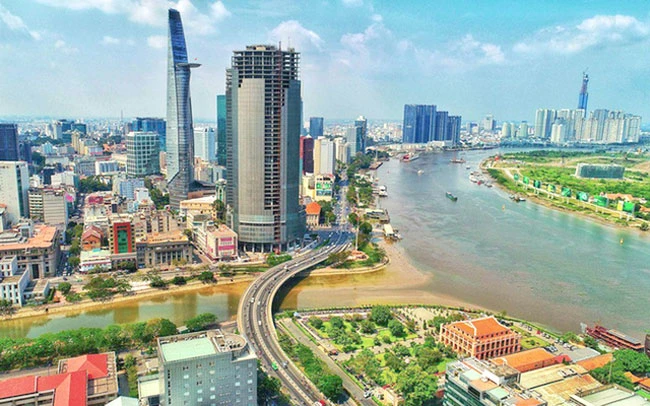
JOURNALIST: - Sir, the creation of Ho Chi Minh City into a regional financial center has been under consideration for several years. In the current global scenario, will turmoil in some financial centers in the region, such as in Hong Kong and Shanghai, provide the opportunity for Ho Chi Minh City to be projected as the next new regional financial center?
Dr. VO TRI THANH: - The idea of creating Ho Chi Minh City into a regional financial center was first muted about 20 years ago. But then due to many reasons, including immature planning, the decision was never finalized. Since 2018, this idea has once again been brought up in connection with the creation of creative cities. People have again become to look at HCMC as a possible financial center, and in competition with other centers like Singapore, Hong Kong and Shanghai, and whether its suitability is better as a large center or just a functional regional center.
In fact, it is necessary to consider what conditions exist for Ho Chi Minh City to become a flourishing financial center. For instance, will the city become a really livable city after it becomes a financial center and will it then have enough integration of sophisticated transactions in lucrative financial dealings? Also worth considering is how to make it a financial center when our policies on finance and our current monetary system has so many limitations. The Vietnamese currency is not yet a convertible currency and not yet completely liberalized. If I were to judge purely on these limitations, I would say that Ho Chi Minh City is still not qualified enough to be developed into a regional financial center.
In the current international context, building HCMC into a financial center must incorporate new ideas and innovations. Firstly, we must define what we mean by "sufficient conditions", because waiting to be "qualified" in the true sense may never be possible. We must therefore be proactive and consider this a process. The problem is that we dare to decide, dare to do, even dare to bet, but we must see all actual facts first. Secondly, when it comes to the concept of financial centers, it should not be understood that this concept is too comprehensive but should instead be very selective. At forums and seminars, there have been many opinions back and forth on the immediate future of HCMC and possibility as a financial center, but the focus must remain on its existing strengths and current outstanding features.
According to me, HCMC can become a financial center if the highlight is more on "green capital" and "green bonds", because this is the future inevitable trend. Currently, not only HCMC, but the whole country is faced with the issue of sustainable development, and huge environmental risks. Therefore, a big city like HCMC, when it comes to this specific issue, will be quite suitable for moving towards this trend and leave an even bigger imprint for the rest of the world to follow.
My opinion would be to go step by step, solve the many underlying problems and gradually and simultaneously build conditions for the City to become a regional financial center. For example, it is necessary to build HCMC as a place that would be highly livable for future generations. We need to invite a team of senior experts for the development of green dynamic urban areas, and attract capital for sustainable development projects. The City must set priority areas, and embrace every problem, so that more opportunities can be created.
- Sir, what priority areas should be the focus now?
- Technology must remain a development priority, even if it is controversial. Currently, technology is changing so rapidly in the world and many economists are cautious of policy groups related to this issue. However, in many countries, as part of a development strategy, they still choose technology as a priority, because of its wide ranging applicability and affiliation to growth in almost all industries.
The question now arises for Vietnam to choose which technology to focus on more. Some countries in the region such as South Korea consider the smart city as a broad concept, which means not only creating the most livable conditions for people, but also a driving force for creativity, digitalization and high technological development to work in which is also a strong lever of growth for other industries. This is the model HCMC should adopt and follow.
However, whichever field of growth we select, the bottom line is still focused on businesses. We win or lose only because of the condition of our businesses, which must be the dynamism for generations to come. Entrepreneurs are the sounding board and the spirit of entrepreneurship and strong entrepreneurship must be constantly nurtured and encouraged. In general, the private sector in our country is huge in number but poor in standards and quality.
Therefore, a smart city must be a city that can mobilize resources from private enterprises, bring in or create the latest technology, have brand attraction, and gradually have and provide a platform that will dominate a wide distribution network that will be recognized by world class businesses. In all this there must be intense aspiration, determination, professionalism and high competitiveness to meet the best of global standards.
Current research shows that the average life expectancy of 500 of the most prestigious enterprises in the world has decreased from 60 years to just 15 years. This means that if change does not occur or new creativity is not brought in, then even large and well-known business brands will die a premature death. Clearly, a growing fast paced economy must be community centered and become a company centric economy.
- Thank you very much.




















